Nursing Epistemology: Ways of Knowing and Their Role in Practice
VerifiedAdded on 2023/06/15
|5
|940
|479
Essay
AI Summary
This essay delves into the concept of 'ways of knowing' in nursing epistemology, examining clinical, empirical, and conceptual knowledge. It discusses the development and purpose of different patterns of knowing, including empirical, aesthetic, self, and ethical knowledge, and their influence on nursing practice. The essay also includes responses to student discussions, elaborating on Carper's fundamentals of knowing, ethical principles like beneficence, non-maleficence, autonomy, and justice, and the importance of emancipatory knowing. It highlights the holistic nature of nursing, blending science and art, and emphasizes the role of 'ways of knowing' in personal and professional development. Desklib provides access to this essay and a wealth of other study resources for students.
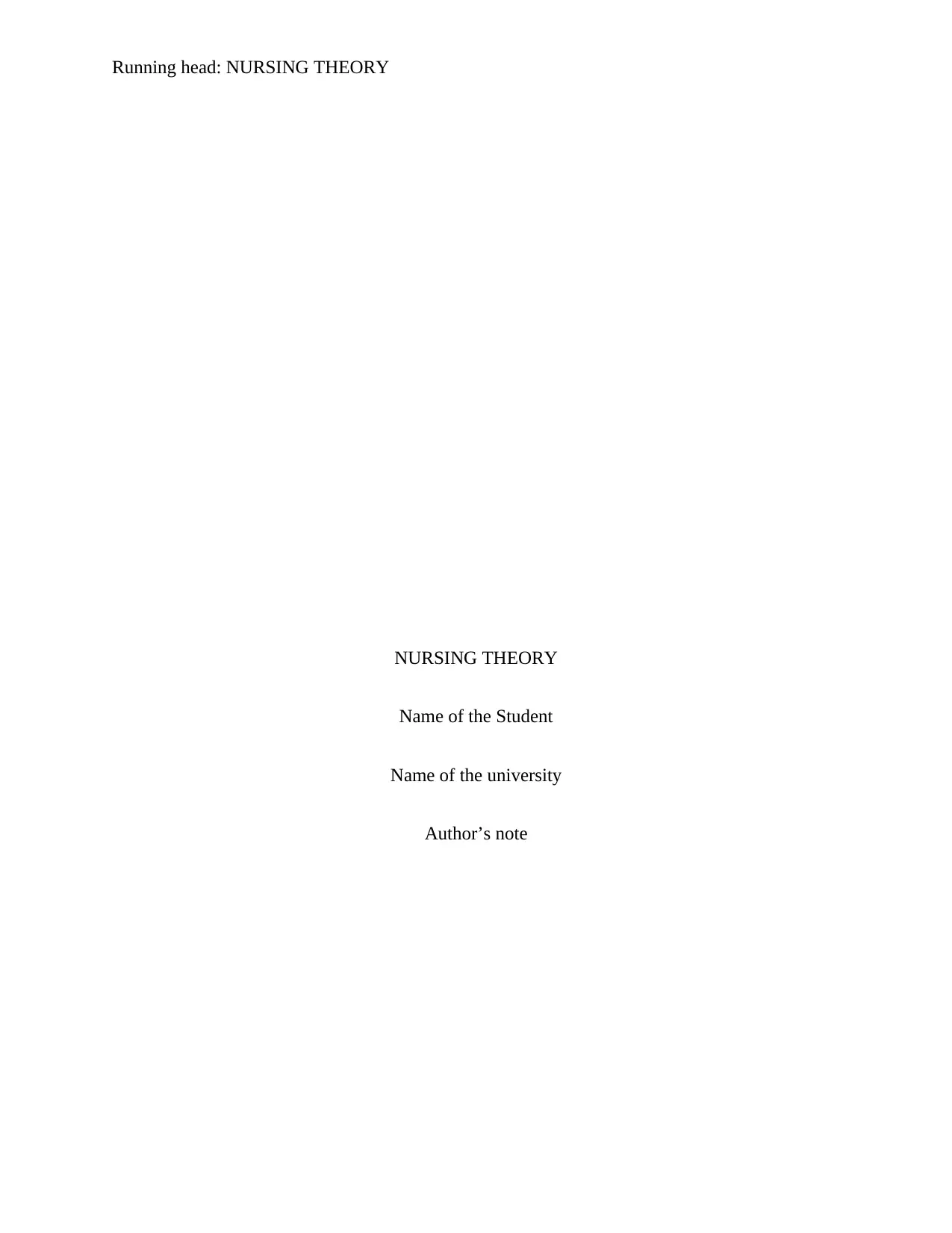
Running head: NURSING THEORY
NURSING THEORY
Name of the Student
Name of the university
Author’s note
NURSING THEORY
Name of the Student
Name of the university
Author’s note
Paraphrase This Document
Need a fresh take? Get an instant paraphrase of this document with our AI Paraphraser
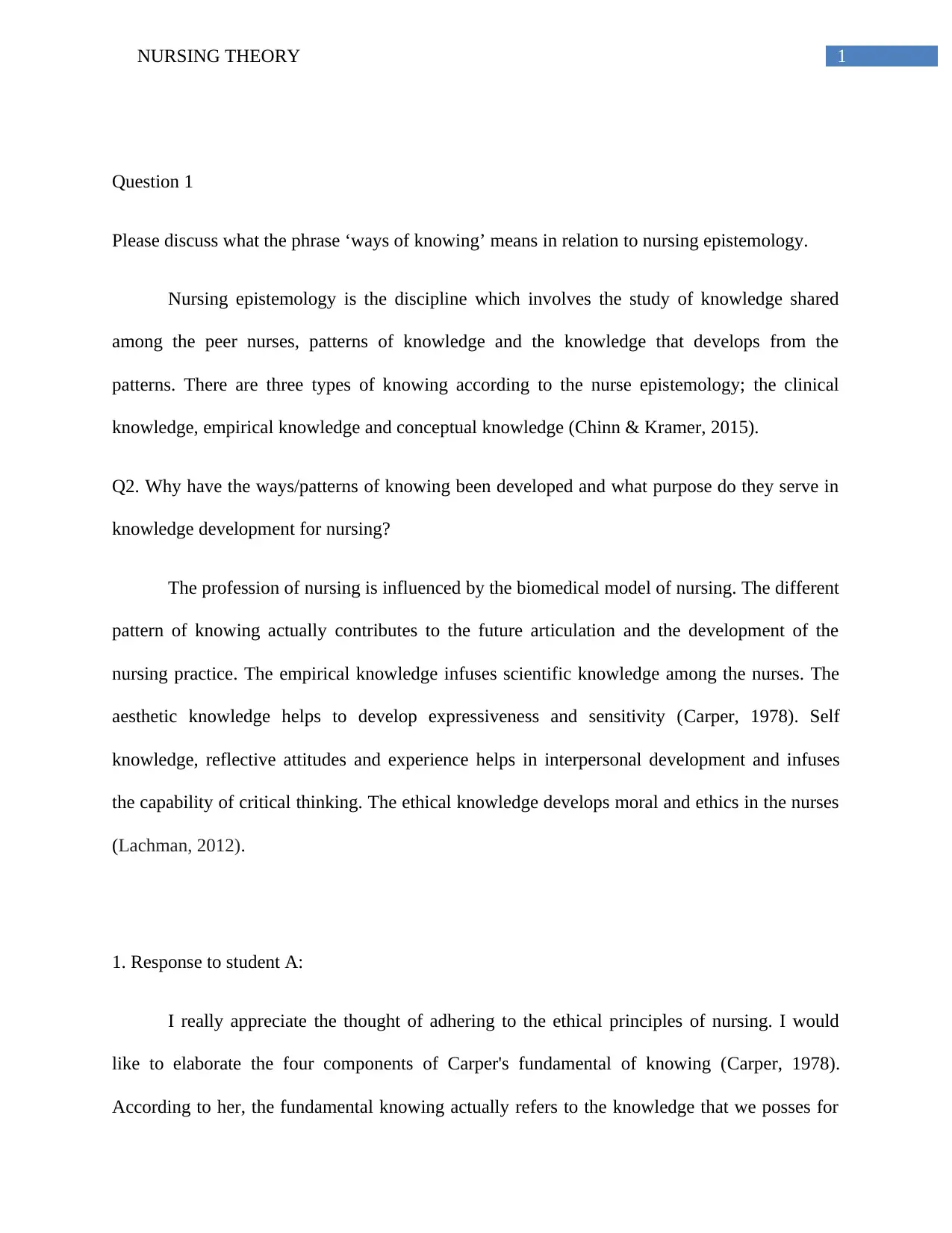
1NURSING THEORY
Question 1
Please discuss what the phrase ‘ways of knowing’ means in relation to nursing epistemology.
Nursing epistemology is the discipline which involves the study of knowledge shared
among the peer nurses, patterns of knowledge and the knowledge that develops from the
patterns. There are three types of knowing according to the nurse epistemology; the clinical
knowledge, empirical knowledge and conceptual knowledge (Chinn & Kramer, 2015).
Q2. Why have the ways/patterns of knowing been developed and what purpose do they serve in
knowledge development for nursing?
The profession of nursing is influenced by the biomedical model of nursing. The different
pattern of knowing actually contributes to the future articulation and the development of the
nursing practice. The empirical knowledge infuses scientific knowledge among the nurses. The
aesthetic knowledge helps to develop expressiveness and sensitivity (Carper, 1978). Self
knowledge, reflective attitudes and experience helps in interpersonal development and infuses
the capability of critical thinking. The ethical knowledge develops moral and ethics in the nurses
(Lachman, 2012).
1. Response to student A:
I really appreciate the thought of adhering to the ethical principles of nursing. I would
like to elaborate the four components of Carper's fundamental of knowing (Carper, 1978).
According to her, the fundamental knowing actually refers to the knowledge that we posses for
Question 1
Please discuss what the phrase ‘ways of knowing’ means in relation to nursing epistemology.
Nursing epistemology is the discipline which involves the study of knowledge shared
among the peer nurses, patterns of knowledge and the knowledge that develops from the
patterns. There are three types of knowing according to the nurse epistemology; the clinical
knowledge, empirical knowledge and conceptual knowledge (Chinn & Kramer, 2015).
Q2. Why have the ways/patterns of knowing been developed and what purpose do they serve in
knowledge development for nursing?
The profession of nursing is influenced by the biomedical model of nursing. The different
pattern of knowing actually contributes to the future articulation and the development of the
nursing practice. The empirical knowledge infuses scientific knowledge among the nurses. The
aesthetic knowledge helps to develop expressiveness and sensitivity (Carper, 1978). Self
knowledge, reflective attitudes and experience helps in interpersonal development and infuses
the capability of critical thinking. The ethical knowledge develops moral and ethics in the nurses
(Lachman, 2012).
1. Response to student A:
I really appreciate the thought of adhering to the ethical principles of nursing. I would
like to elaborate the four components of Carper's fundamental of knowing (Carper, 1978).
According to her, the fundamental knowing actually refers to the knowledge that we posses for
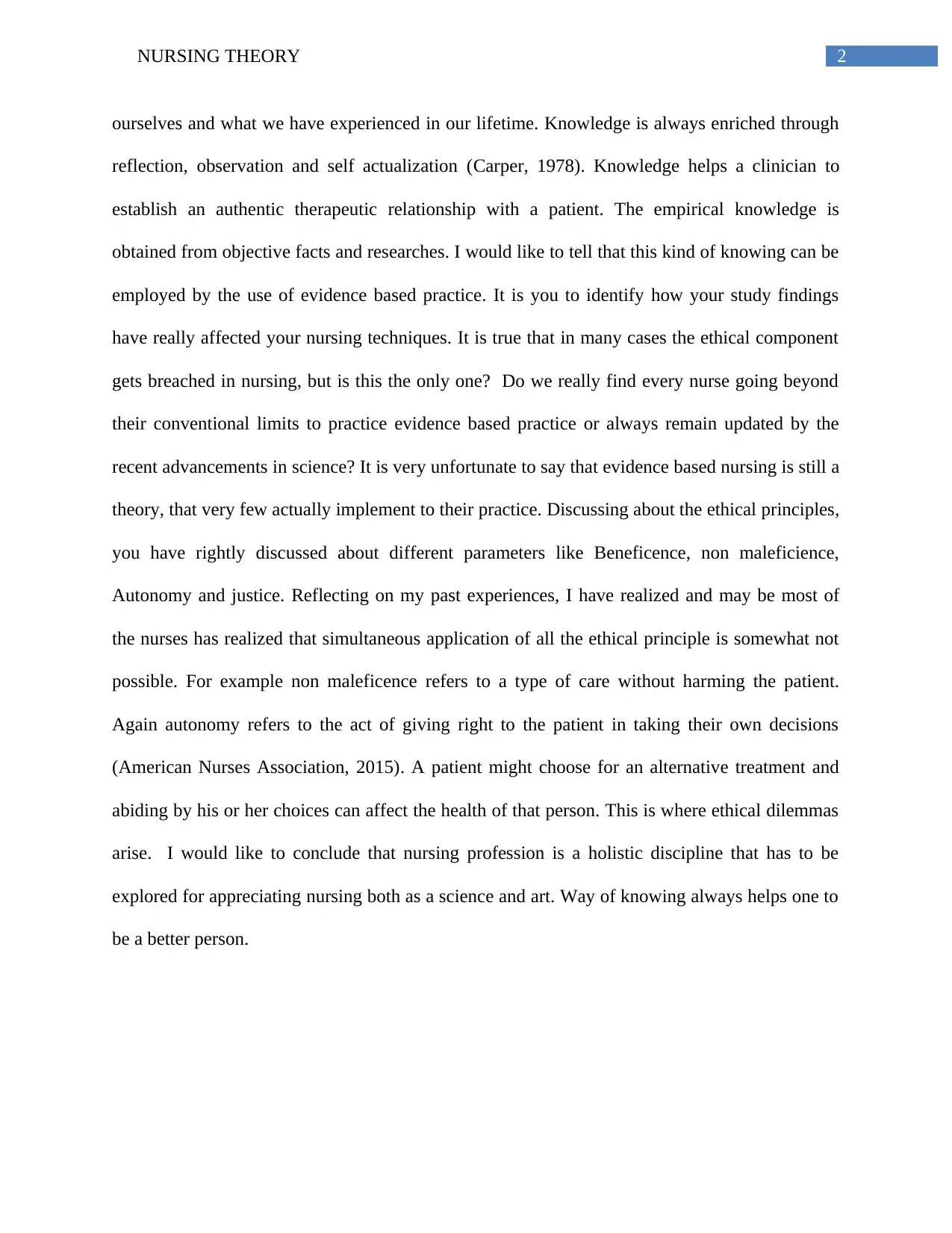
2NURSING THEORY
ourselves and what we have experienced in our lifetime. Knowledge is always enriched through
reflection, observation and self actualization (Carper, 1978). Knowledge helps a clinician to
establish an authentic therapeutic relationship with a patient. The empirical knowledge is
obtained from objective facts and researches. I would like to tell that this kind of knowing can be
employed by the use of evidence based practice. It is you to identify how your study findings
have really affected your nursing techniques. It is true that in many cases the ethical component
gets breached in nursing, but is this the only one? Do we really find every nurse going beyond
their conventional limits to practice evidence based practice or always remain updated by the
recent advancements in science? It is very unfortunate to say that evidence based nursing is still a
theory, that very few actually implement to their practice. Discussing about the ethical principles,
you have rightly discussed about different parameters like Beneficence, non maleficience,
Autonomy and justice. Reflecting on my past experiences, I have realized and may be most of
the nurses has realized that simultaneous application of all the ethical principle is somewhat not
possible. For example non maleficence refers to a type of care without harming the patient.
Again autonomy refers to the act of giving right to the patient in taking their own decisions
(American Nurses Association, 2015). A patient might choose for an alternative treatment and
abiding by his or her choices can affect the health of that person. This is where ethical dilemmas
arise. I would like to conclude that nursing profession is a holistic discipline that has to be
explored for appreciating nursing both as a science and art. Way of knowing always helps one to
be a better person.
ourselves and what we have experienced in our lifetime. Knowledge is always enriched through
reflection, observation and self actualization (Carper, 1978). Knowledge helps a clinician to
establish an authentic therapeutic relationship with a patient. The empirical knowledge is
obtained from objective facts and researches. I would like to tell that this kind of knowing can be
employed by the use of evidence based practice. It is you to identify how your study findings
have really affected your nursing techniques. It is true that in many cases the ethical component
gets breached in nursing, but is this the only one? Do we really find every nurse going beyond
their conventional limits to practice evidence based practice or always remain updated by the
recent advancements in science? It is very unfortunate to say that evidence based nursing is still a
theory, that very few actually implement to their practice. Discussing about the ethical principles,
you have rightly discussed about different parameters like Beneficence, non maleficience,
Autonomy and justice. Reflecting on my past experiences, I have realized and may be most of
the nurses has realized that simultaneous application of all the ethical principle is somewhat not
possible. For example non maleficence refers to a type of care without harming the patient.
Again autonomy refers to the act of giving right to the patient in taking their own decisions
(American Nurses Association, 2015). A patient might choose for an alternative treatment and
abiding by his or her choices can affect the health of that person. This is where ethical dilemmas
arise. I would like to conclude that nursing profession is a holistic discipline that has to be
explored for appreciating nursing both as a science and art. Way of knowing always helps one to
be a better person.
⊘ This is a preview!⊘
Do you want full access?
Subscribe today to unlock all pages.

Trusted by 1+ million students worldwide
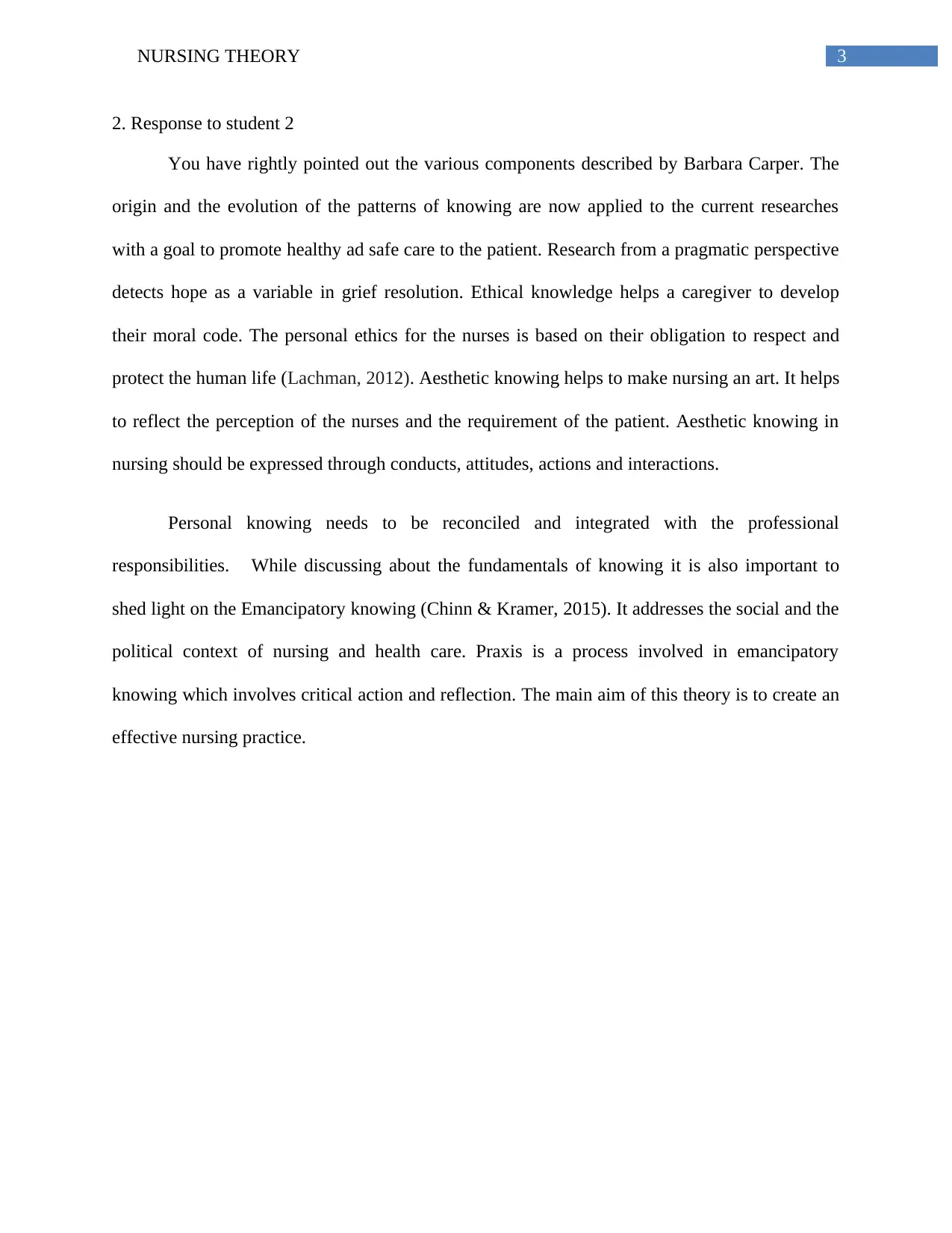
3NURSING THEORY
2. Response to student 2
You have rightly pointed out the various components described by Barbara Carper. The
origin and the evolution of the patterns of knowing are now applied to the current researches
with a goal to promote healthy ad safe care to the patient. Research from a pragmatic perspective
detects hope as a variable in grief resolution. Ethical knowledge helps a caregiver to develop
their moral code. The personal ethics for the nurses is based on their obligation to respect and
protect the human life (Lachman, 2012). Aesthetic knowing helps to make nursing an art. It helps
to reflect the perception of the nurses and the requirement of the patient. Aesthetic knowing in
nursing should be expressed through conducts, attitudes, actions and interactions.
Personal knowing needs to be reconciled and integrated with the professional
responsibilities. While discussing about the fundamentals of knowing it is also important to
shed light on the Emancipatory knowing (Chinn & Kramer, 2015). It addresses the social and the
political context of nursing and health care. Praxis is a process involved in emancipatory
knowing which involves critical action and reflection. The main aim of this theory is to create an
effective nursing practice.
2. Response to student 2
You have rightly pointed out the various components described by Barbara Carper. The
origin and the evolution of the patterns of knowing are now applied to the current researches
with a goal to promote healthy ad safe care to the patient. Research from a pragmatic perspective
detects hope as a variable in grief resolution. Ethical knowledge helps a caregiver to develop
their moral code. The personal ethics for the nurses is based on their obligation to respect and
protect the human life (Lachman, 2012). Aesthetic knowing helps to make nursing an art. It helps
to reflect the perception of the nurses and the requirement of the patient. Aesthetic knowing in
nursing should be expressed through conducts, attitudes, actions and interactions.
Personal knowing needs to be reconciled and integrated with the professional
responsibilities. While discussing about the fundamentals of knowing it is also important to
shed light on the Emancipatory knowing (Chinn & Kramer, 2015). It addresses the social and the
political context of nursing and health care. Praxis is a process involved in emancipatory
knowing which involves critical action and reflection. The main aim of this theory is to create an
effective nursing practice.
Paraphrase This Document
Need a fresh take? Get an instant paraphrase of this document with our AI Paraphraser
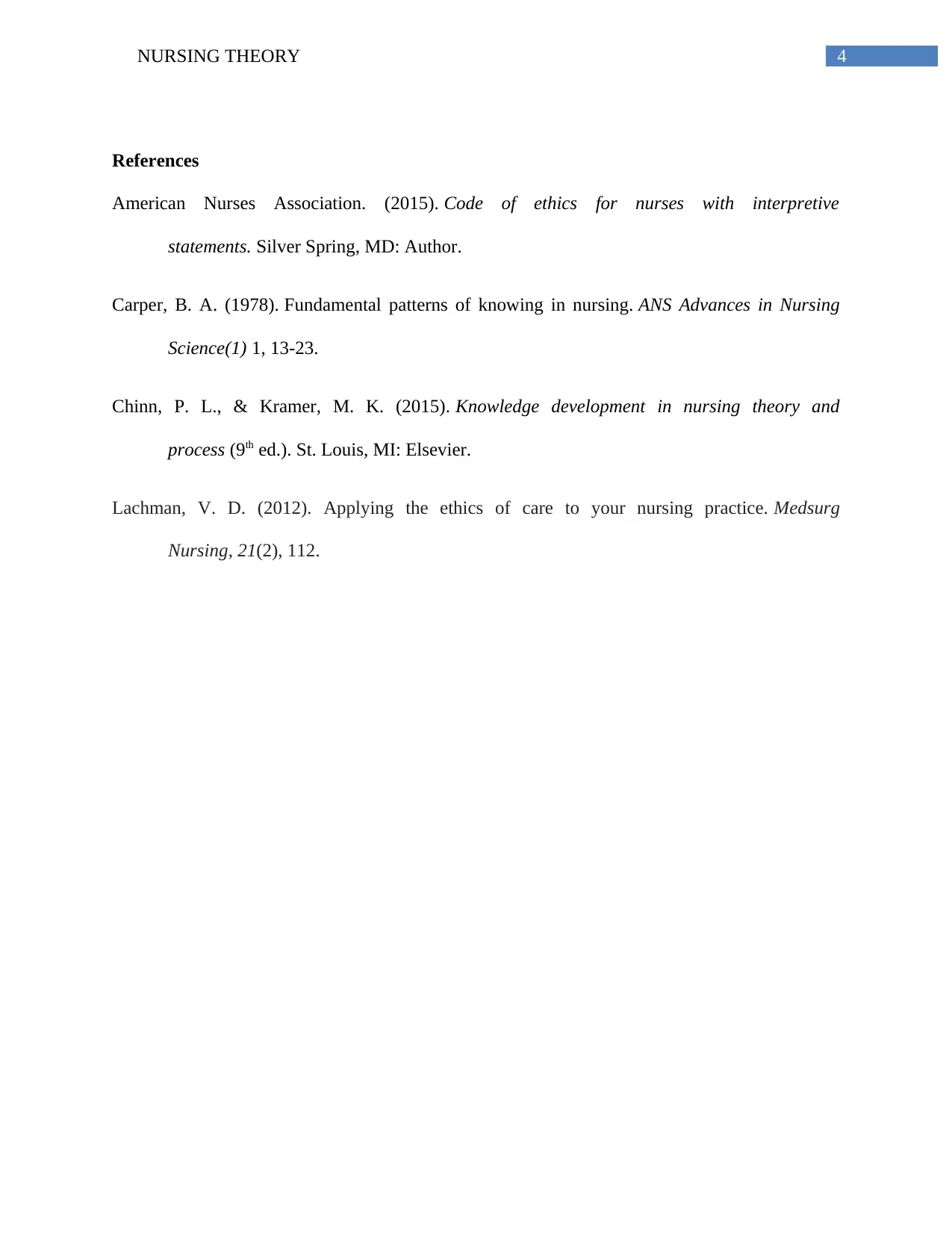
4NURSING THEORY
References
American Nurses Association. (2015). Code of ethics for nurses with interpretive
statements. Silver Spring, MD: Author.
Carper, B. A. (1978). Fundamental patterns of knowing in nursing. ANS Advances in Nursing
Science(1) 1, 13-23.
Chinn, P. L., & Kramer, M. K. (2015). Knowledge development in nursing theory and
process (9th ed.). St. Louis, MI: Elsevier.
Lachman, V. D. (2012). Applying the ethics of care to your nursing practice. Medsurg
Nursing, 21(2), 112.
References
American Nurses Association. (2015). Code of ethics for nurses with interpretive
statements. Silver Spring, MD: Author.
Carper, B. A. (1978). Fundamental patterns of knowing in nursing. ANS Advances in Nursing
Science(1) 1, 13-23.
Chinn, P. L., & Kramer, M. K. (2015). Knowledge development in nursing theory and
process (9th ed.). St. Louis, MI: Elsevier.
Lachman, V. D. (2012). Applying the ethics of care to your nursing practice. Medsurg
Nursing, 21(2), 112.
1 out of 5
Related Documents
Your All-in-One AI-Powered Toolkit for Academic Success.
+13062052269
info@desklib.com
Available 24*7 on WhatsApp / Email
![[object Object]](/_next/static/media/star-bottom.7253800d.svg)
Unlock your academic potential
Copyright © 2020–2025 A2Z Services. All Rights Reserved. Developed and managed by ZUCOL.





